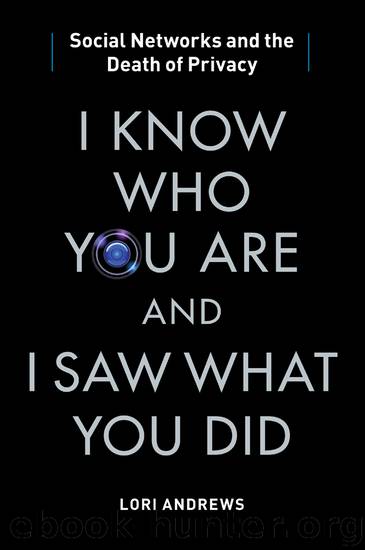I Know Who You are and I Saw What You Did by Lori Andrews

Author:Lori Andrews
Language: eng
Format: epub
Publisher: Free Press
Even if we specifically designate our social network pages as private, social network sites do a particularly bad job of protecting privacy. In 2011, Joanne Kuzma of the University of Worcester analyzed the privacy practices of 60 social networks, including Facebook, Myspace, and LinkedIn. The good news is that 92% of the social networking sites in the study were found to have some type of overall privacy policy. The bad news is that 37% of websites were found to contain third-party cookies and 90% contained web beacons. Such privacy invaders are able to track information about how many times the user accesses a page, his browsing history within a site, and any information he types into forms on the site (including credit card information and Social Security numbers).34 Another study, conducted by researchers at Cambridge University, found that social networks such as Facebook and Myspace made it difficult for users to determine their privacy policy.35 The authors suggested that social networks do so due to concerns that people would not sign up if they knew how limited the privacy protections were.36
“We wouldn’t recommend posting anything there that you wouldn’t want marketers, legal authorities, governments (or your mother) to see, especially as Facebook continues to push more and more of users’ information public and even into the hands of other companies, leaving the onus on users to figure out its Rubik’s Cube–esque privacy controls,” says Wired technology columnist Eliot Van Buskirk.37
Privacy on social networks is even a concern of the savvy high tech experts, some of whom feel violated by the way in which Facebook has played fast and loose with its privacy settings. When it started, Facebook gave users complete control over their privacy settings. Then, noted Ryan Singel of Wired, “it reneged on its privacy promises and made much of your profile information public by default.”38 After the change, there was no way to make your name, city, photo, or friends private, and causes, likes, and links were public unless you removed them from your profile entirely. Singel expressed his frustration with the lack of control: “I’d like to have my profile visible only to my friends, not my boss. Cannot. I’d like to support an anti-abortion group without my mother or the world knowing. Cannot.”39
Even trying to assert control of the information that Facebook does let you keep private is a chore. The New York Times pointed out in a complicated diagram that “To manage your privacy on Facebook, you will need to navigate through 50 settings with more than 170 options.”40
At least with Facebook, you can ultimately find the site’s privacy statement and read through its 45,000-word privacy policies.41 Data aggregators that are collecting information from your social networks pages, your search requests, and your emails don’t provide a ready way for you to know you’re being targeted.
Advertisers use data aggregation and targeted ads to enhance a company’s bottom line by offering you personalized ads. Emails from your Gmail account undergo text analysis for similar commercial purposes. But the potential for analyzing your proclivities is expanding beyond commercial enterprises.
Download
This site does not store any files on its server. We only index and link to content provided by other sites. Please contact the content providers to delete copyright contents if any and email us, we'll remove relevant links or contents immediately.
| Blogging & Blogs | eBay |
| E-Commerce | Hacking |
| Online Searching | Podcasts & Webcasts |
| Search Engine Optimization | Social Media |
| Social Media for Business | Web Browsers |
| Web Marketing |
Sass and Compass in Action by Wynn Netherland Nathan Weizenbaum Chris Eppstein Brandon Mathis(7397)
Grails in Action by Glen Smith Peter Ledbrook(7291)
Secrets of the JavaScript Ninja by John Resig Bear Bibeault(5951)
Kotlin in Action by Dmitry Jemerov(4633)
Mastering Azure Security by Mustafa Toroman and Tom Janetscheck(3011)
Learning React: Functional Web Development with React and Redux by Banks Alex & Porcello Eve(2830)
WordPress Plugin Development Cookbook by Yannick Lefebvre(2578)
Mastering Bitcoin: Programming the Open Blockchain by Andreas M. Antonopoulos(2504)
The Art Of Deception by Kevin Mitnick(2292)
Drugs Unlimited by Mike Power(2188)
Kali Linux - An Ethical Hacker's Cookbook: End-to-end penetration testing solutions by Sharma Himanshu(2095)
Writing for the Web: Creating Compelling Web Content Using Words, Pictures and Sound (Eva Spring's Library) by Lynda Felder(2066)
SEO 2018: Learn search engine optimization with smart internet marketing strategies by Adam Clarke(2017)
JavaScript by Example by S Dani Akash(1947)
DarkMarket by Misha Glenny(1844)
Wireless Hacking 101 by Karina Astudillo(1842)
Full-Stack React Projects by Shama Hoque(1767)
Social Selling Mastery by Jamie Shanks(1745)
Hack and HHVM by Owen Yamauchi(1670)
